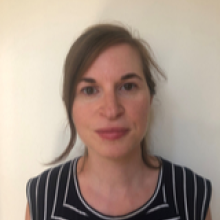Rachel Sandwell

PhD McGill University
MSc, London School of Economics
Histories of global feminisms; intellectual history of feminism; critical histories of international development; transnational women’s movements; decolonization and national liberation; memoirs and historical memory; histories of sexual and reproductive health.
By appointment
I am a historian of global feminisms and feminism’s intersections with decolonization. I have been a full-time Faculty Lecturer in the Department of History & Classical Studies and the Institute for Gender, Sexuality, and Feminist Studies since 2019. My inter-disciplinary research explores how women’s thought and activism shape post-colonial politics, with particular attention to women’s contributions to political liberation movements in the global south in the second half of the twentieth century. I argue that attending to women’s work in these political spaces helps us better understand the utopian vision these movements proposed, and enriches our understanding of the global history of feminism. Trained as a social historian, I work across the fields of literary analysis and feminist theory; my earlier training in anthropology and the history of medicine informs my research and teaching.
My first book, entitled National Fantasies: Gender and the Politics of Desire in the Making of South Africa, argues that women played a key role in liberation movement politics during the struggle against apartheid, including via activism for sexual and reproductive health services within liberation movements, and worked actively to build a post-apartheid state where gender roles as well as race relations were transformed. This research explores transnational connections between Black women thinkers in South Africa, the US, the UK, and across decolonizing African nations, highlighting women’s contributions to theorizing anti-colonial freedom in Africa.
I am working on two new projects. The first, entitled Exile’s Haunting, uses novels to explore how women’s bodies become central metaphors for imagining social transformation during and after the period of decolonization in Africa, and particularly in the space of exiled national liberation movements, and asks how this constrains and enables women’s rights. My second new project, entitled Developing Liberation, examines how recently independent African states and international NGOs, including Canadian development organizations, navigated often tense relationships with African liberation movements in the 1970s and 1980s. At this time, as thousands of people fled instability in Angola, Mozambique, and South Africa, the line between “refugee” and “political exile” was often blurred for all involved, and navigating the distinction had serious consequences for the recently independent African states that hosted these displaced people, for the NGOs that worked with them, and for the international organizations that attempted to support them. This research will contribute to the transnational history of international development, histories of refugee experience, and theoretical work on post-colonial sovereignty; it also considers Canada’s international development engagements in this domain, both official and unofficial.
2022 “Fantasy States: Nationalism, Intimacy, and Transgression in South African Women’s Political Memoirs", Signs: Journal of Women in Culture and Society (forthcoming, vol 47, no 3, Spring 2022) (shortlisted for the Catharine Stimpson Prize for Outstanding Feminist Scholarship)
2018 Sandwell, Rachel, Deborah Bonser, Emmanuelle Hebert, Katrina Kilroy, Sebalda Leshabari, Feddy Mwanga, Agnes Mtawa, Anne Wilson and Amelie Moritz. “Stronger together: midwifery twinning between Tanzania and Canada,” Globalization and Health (BMC Springer Nature) 2018, 14:123 https://doi.org/10.1186/s12992-018-0442-x
2018 “The Travels of Florence Mophosho: The African National Congress and Left Internationalism,” Journal of Women’s History (Johns Hopkins University Press), 2018, vol 30, no 4 pp.84-108
2017 “If Not Feminism, Then What? Women’s Work in the African National Congress, 1980-1990,” in Women’s Activism and "Second Wave" Feminism: Transnational Histories, (eds) Jennifer Nelson and Barbara Molony. (London, Bloomsbury Press: 2017).
2015 “Love I Cannot Begin to Explain: The politics of reproduction in the ANC in Exile, 1976-1990.”Journal of Southern African Studies. (Taylor and Francis) 2015. 4:1, 63-81.